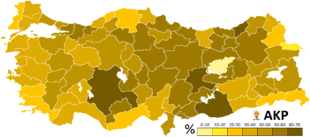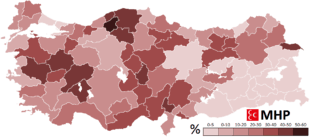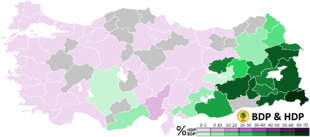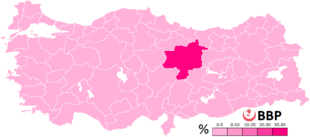Turkish local elections, 2014
|
| |||||||||||||||||||||||||||||||||||||||||||||||||||||||||||||||||
| |||||||||||||||||||||||||||||||||||||||||||||||||||||||||||||||||
All 30 metropolitan and 1,351 district municipal mayors of Turkey All 1,251 provincial and 20,500 municipal councillors of Turkey | |||||||||||||||||||||||||||||||||||||||||||||||||||||||||||||||||
|---|---|---|---|---|---|---|---|---|---|---|---|---|---|---|---|---|---|---|---|---|---|---|---|---|---|---|---|---|---|---|---|---|---|---|---|---|---|---|---|---|---|---|---|---|---|---|---|---|---|---|---|---|---|---|---|---|---|---|---|---|---|---|---|---|---|
| |||||||||||||||||||||||||||||||||||||||||||||||||||||||||||||||||
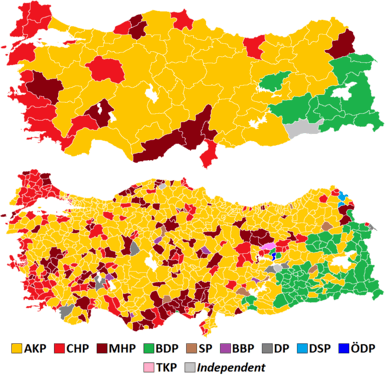 Results map showing the winning party by provincial capitals (top) and by the districts of Turkey (bottom) ^ Four different elections in order to elect both types of councillor and mayor were held on the same day. The results shown here are the municipal councillor election results, which best reflect the overall voting intentions of the electorate. See the results section for the full results. * The Peace and Democracy Party (BDP) ran alongside the Peoples' Democratic Party (HDP). The combined results of both are shown. | |||||||||||||||||||||||||||||||||||||||||||||||||||||||||||||||||
Local elections (formal: Local authority general elections, Turkish: Mahalli İdareler Genel Seçimi or simply Yerel Seçimleri) were held in Turkey on 30 March 2014, with some repeated on 1 June 2014. Metropolitan and district mayors as well as their municipal council members in cities, and muhtars and "elderly councils" in rural areas (and also in mahalles within urban areas) were elected. In light of the controversy around the elections, it was viewed as a referendum on the government of Prime Minister Recep Tayyip Erdoğan.[1] About 50 million people were eligible to vote.
A local government re-organisation took place before the election, lowering the total number of elected officials from 38,592 to 23,132. Almost 1,500 beldes (small municipal towns) had their municipalities abolished, meaning that a significantly fewer number of mayors were elected compared to the 2009 local elections. Most provinces no longer elect any provincial councillors. The number of metropolitan municipalities, however, rose from 16 to 30.
The elections were marred by allegations of electoral fraud[2][3][4] and violence, with both opposition and ruling party candidates alike refusing to recognise a wide variety of results. Significant cases of fraud in Ankara[5] and Yalova[6] were referred to the Supreme Electoral Council of Turkey for reviewal. Allegations of misconduct included the untimely power cuts in several areas while the votes were being counted (claimed to be caused by cats entering transformers), intimidation by government forces such as the European Union Minister Mevlüt Çavuşoğlu and the Anatolian Agency in electorally strategic districts, the theft and burning of votes cast for opposition candidates and the recording of opposition votes as invalid or blank.[7][8][9][10][11][12] The elections had been controversial due to allegations of government corruption, voter bribery and the lack of up-to-date voter records beforehand.[13][14]
Regardless, the governing Justice and Development Party (AKP) declared victory in the early hours of 31 March,[15] gaining 42.89% of the vote, 818 municipalities and 11,309 councillors. The opposition Republican People's Party (CHP) came second with 26.34%, 232 municipalities and 4,320 councillors, announcing that it would be filing complaints against alleged electoral manipulation.[16][17][18] By 4 April 2014, numerous municipalities changed mayors following recounts.[19] Gradual post-election revelations of alleged widespread irregularities in several cities sparked pro-democracy protests after provisional results were announced, while the Electoral Council declared results in some areas null and void.[20][21] A repeat of the elections in these areas took place on 1 June. These most notably occurred in Yalova and Ağrı, in which the ruling AKP had lost by a small margin to the CHP and BDP respectively on March 30. In a first of a series of trials relating to electoral fraud claims, a returning officer was sentenced to five years in prison in June 2015 after being found guilty of transferring CHP votes to the AKP.[22]
Background
Turkish local elections are held every five years in order to elect mayors to 30 metropolitan municipalities, 1,008 district municipalities and 2,187 town municipalities.[23] In addition, an excess of 53,450 neighbourhood leaders (muhtars) are elected, though most are non-partisan and do not have any declared political allegiance.[24] Elderly and municipal council compositions were also elected through a separate ballot. The previous elections were held on 29 March 2009 and were won by Prime Minister Recep Tayyip Erdoğan's AKP with 38.8% of the vote.[25]
Local government reform
Before the elections, the numbers of councillors and mayors were reduced during the 2013 Turkish local government reorganisation. During the reorganisation, 1,040 beldes were abolished, leaving the number of small town municipalities at 394 and contributing to the reduction in the number of mayors elected in 2014 in comparison to 2009.[26][27]
The following table shows the numbers of metropolitan and district municipalities, as well as provincial and municipal councillors elected in 2009 and in 2014. In local elections, municipal mayors and councillors are the only partisan officials elected.[28][29][30][31]
| Office | Elected in 2009 | Elected in 2014 | Change |
|---|---|---|---|
| Metropolitan municipalities | 16[28] | 30[32] | |
| District municipalities | 2,903[29] | 1,351[33] | |
| Provincial councillors | 3,281[30] | 1,251[34] | |
| Municipal councillors | 32,392[31] | 20,500[35] | |
| Total | 38,592 | 23,132 |
2013–2014 anti-government protests
In 2013, a spate of anti-government protests and counter measures took place. The 2014 local elections are the first elections since the protests, and have thus been seen as a test for the government's popularity following a criticism both domestically and internationally for what was perceived to be a crackdown on peaceful protestors.[36][37] The controversy surrounding the police response resulted in Germany seeking to delay European Union accession talks with Turkey.[38]
17 December corruption scandal
On 17 December 2013, police arrested several close associates and family members of government ministers as part of a corruption investigation. Prime Minister Erdoğan responded by either dismissing or reassigning thousands of police and judicial personnel while denying all allegations of wrongdoing.
A string of recorded phone calls between government ministers and close supporters allegedly discussing corruption were made public following the start of the corruption scandal. On 24 February 2014, a 10-minute phone call between Prime Minister Recep Tayyip Erdoğan and his son Necmettin Bilal Erdoğan were made public, in which the Prime Minister was warning his son of police searches in other government ministers' residences and telling him to "nullify" any cash which might be stored in their own. The tape caused particular damnation, after which CHP leader Kemal Kılıçdaroğlu advised the Prime Minister to "flee by helicopter."[39] The Prime Minister responded by calling the tape a "montage," though this claim could not be verified by the national scientific development agency TÜBİTAK.[40][41][42] It was reported that six people were removed from their roles at TÜBİTAK for refusing to falsify the recording,[43][44] with one reporting that he was openly asked by superiors to manipulate reports related to the recordings.[45][46]
Following the release, thousands took to the streets demanding the government's resignation.[47][48][49] Protesters threw fake money in the air and also left empty shoe boxes near AKP offices, symbolising the US$4.5 million found stuffed into shoe-boxes at the home of Halkbank's former manager Süleyman Aslan[50] Though protests were not as large as the June 2013 Gezi protests, the police were again criticised for a brutal crackdown.[51][52]
Judiciary, Internet & MİT laws
The government responded to the tape revelations by pushing through three controversial laws which would tighten the AKP's grip on the judiciary,[53] allow greater control over internet access,[54] and increase the powers of Turkey's intelligence services (MİT).[55] While some saw these laws as necessary to restore peace throughout the country and increase internet safety, the opposition accused the government for openly attempting to increase their powers in order to further defame the rule of law. Regardless, the AKP's sizeable parliamentary majority led to all laws being passed by the Turkish Grand National Assembly. The laws also caused a rift between Prime Minister Erdoğan and President Abdullah Gül, who criticised some aspects of the laws. Regardless of their differences, the President signed the bills into law despite speculation that he might veto them.
The new laws drew criticism from the public, with several demonstrators taking to the streets accusing the government of encroachments against their rights and privacy.[56] Protestors again clashed with police, though the protests failed to materialise back to June 2013 levels.[57][58]
Twitter and YouTube bans
On 20 March 2014, ten days before the elections, Prime Minister Erdoğan threatened to "wipe out" Twitter during an election rally in Bursa.[59] Thousands of Turkish web users found that they could not access the site hours after the speech, with the government claiming that Twitter had failed repeatedly to adhere to Turkish court orders requiring the removal of some links.[60] Despite causing outrage, the Twitter ban was almost completely overcome by users simply changing DNS settings.[61] The government retaliated just a few days before the elections by blocking Google's DNS service, making defiance more difficult.[62][63][64] Regardless, #erdoganblockedtwitter, #twitterisblockedinturkey and #turkeyblockedtwitter began trending worldwide soon after news of the ban was made public.[65]
On 21 March 2014, Ankara's Attorney General issued a statement denying the government's claims that they had a court order validating the ban on Twitter.[66][67][68] The ban's practical failure and its violation of internet freedoms received criticism, and the US House of Representatives was presented with two resolutions condemning the Turkish government for blocking Twitter and YouTube.[69][70] On 2 April, 3 days after the elections, the Turkish Constitutional Court issued a verdict annulling the Twitter ban for its violation of Article 26 (Freedom of Expression) of the Turkish Constitution.[71][72]
On 28 March 2014, the telecommunications regulator (TİB) made use of the government's new controversial internet law by blocking YouTube without court order.[73] The ban occurred shortly after the release and placing on YouTube of a recorded conversation allegedly between the deputy armed forces chief of staff Yaşar Güler, Foreign Minister Ahmet Davutoğlu, Foreign Ministry undersecretary Feridun Sinirlioğlu and Ministry of Intelligence Undersecretary Hakan Fidan.[74][75] In the conversation, Fidan was allegedly recorded considering a deliberate act of military aggression against Syria in order to spark a war.[76][77] While not confirming the validity of the recording, Prime Minister Erdoğan claimed that the making of the recording was "treacherous," and that YouTube had subsequently been blocked due to concerns for national security.[78]
Pre-election rigging controversies
In the lead-up to elections, both the ruling AKP and opposition parties warned that preparations for substantial electoral fraud were being taken.[79]
In December 2013, it emerged that several voters had been made members of different political parties without their approval in an attempt to bolster support without their consent. Voters affected appealed to the Prosecutor General's office after it emerged that their details had been used to register them.[80]

On 29 February 2014, a recording of a phone call between Ankara metropolitan mayor Melih Gökçek and the Prime Minister's secretary Mustafa Varank allegedly depicted both agreeing to censor the opposition CHP's election posters.[82][83] The recording has not yet been proven to be either legitimate or fake.
Concerns were raised in Ankara as CHP metropolitan mayoral candidate Mansur Yavaş claimed that there were 58,000 duplicate records in Ankara alone that would allow select voters to vote twice. He also announced that his election team would do everything to prevent such manipulation. The MHP candidate Mevlüt Karakaya also called for voters and ballot officials to remain vigilant. Meanwhile, the incumbent AKP candidate Melih Gökçek accused "marginal groups" of plotting to rig the elections, blaming them for the AKP's losses in Ankara's Yenimahalle, Etimesgut and Gölbaşı districts in the 2009 elections.[84] The provisional results in Ankara, which initially showed a 0.9% lead for the AKP, were widely criticised by the opposition and caused a massive recounting campaign by the CHP.
Turkish Newspaper Cumhuriyet claimed that the Supreme Electoral Council of Turkey (YSK) had printed 141,654,161 ballot papers despite an electorate formed of 52,695,831 voters.[85] Some sources, including the YSK itself, put the number of ballot papers printed to between 144 and 151 million. The YSK responded by defending its decision, saying that it was required by law to send 15% more ballot papers extra to each ballot box. The YSK also re-iterated that more than one ballot paper was required per voter since different ballots were used to elect municipal mayors, muhtars and city councils.[86] Nevertheless, members of the opposition raised concern on how the extra ballot papers would be utilised, with MHP MPs warning that the spare ballot papers would be used by the PKK to increase the votes of the pro-Kurdish BDP in the south-east.[87]
Several controversies following the distribution of ballot papers to voter's residences before the elections raised concern about the validity of the YSK's voter records. Upon receiving extra ballot papers, several families complained to the YSK, claiming to have received more ballot papers than necessary. It was also observed that dead citizens were on the electoral roll, and several ballot papers had been sent to persons who had been dead for a considerable amount of time or false addresses which did not exist.[87] On 15 March 2014, Ankara's AKP mayor Melih Gökçek spoke on live television regarding the possible use of Chinese temporary tattoo pens whilst recording the results from each ballot box. This would allegedly mean that some results would completely disappear shortly after being recorded, allowing "some groups" to edit the numbers while transporting the ballot result papers to the YSK.[79] The opposition CHP candidate Mansur Yavaş replied by calling the mayor "paranoid," adding that he was a "mayor from the ruling party. Rather than announcing these allegations on television, he should be taking legal action."[88]
On 29 March 2014, the police received a tip-off that large numbers of fake ballot papers were being stored at a printing press in the district of Gaziemir in Izmir.[89] Despite conducting a detailed search of the compound, the police failed to find any fake votes.[90] Despite reports by several news agencies, the allegations that a van full of ballot papers with a pre-printed "yes" vote for the AKP was impounded on in Izmir's Çınarlı district[91][92][93][94][95] could not be verified due to a similar situation being reported before the 2011 general elections.[96]
Another debate was on the voting rights of the 250,000 Syrian refugees living in Turkey due to the Syrian Civil War. The controversy began in late 2013 after the CHP's deputy leader Gürsel Tekin claimed that several refugees had been registered on the electoral roll.[97] The Ministry of the Interior responded by stating that a non-citizen within Turkey had to wait five years before being eligible to vote. However, it emerged that several Syrian refugees had been made Turkish citizens already.[98] While the opposition claimed that Syrian votes would be used to bolster AKP support due to their lax border policies,[99] the government and the Association for Solidarity with Refugees denied these claims.[100][101] Nevertheless, three Syrians were caught attempting to cast votes during the elections.[102]
Parties
The incumbent national party is the Justice and Development Party (AKP), and its principal opposition parties are the Republican People's Party (CHP) and Nationalist Movement Party (MHP). The Peace and Democracy Party (BDP) is a Kurdish party; the new left wing party, the Peoples' Democratic Party, is allied with it.[103]
Campaign
Large-scale election rallies dominated the pre-election political scene, mostly being held by the governing AKP and the main opposition CHP.
Conduct
About 50 million people were eligible to vote in 1379 electoral sees. On election day, violence resulted in eight deaths. The Doğan news agency reported six deaths and four injuries in the village of Yuvacık in Şanlıurfa. It also reported that in Hatay rival families fought with clubs, knives and guns in support of their respective candidates resulting in two deaths and nine injuries.[1][104] In the early hours of 31 March, 1,418 claims of electoral fraud were reported.[105] Power cuts during the counting process in some provinces,[106] as well as the publication of widely different results by different news agencies, also caused controversy.[107]
Results
| Party | Justice and Development Party AKP |
Republican People's Party CHP |
Nationalist Movement Party MHP |
Peace and Democracy Party BDP+HDP |
Felicity Party SP |
Great Union Party BBP |
| Leader | Recep Tayyip Erdoğan | Kemal Kılıçdaroğlu | Devlet Bahçeli | Selahattin Demirtaş (HDP) | Mustafa Kamalak | Mustafa Destici |
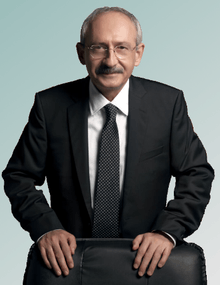 |
.jpg) |
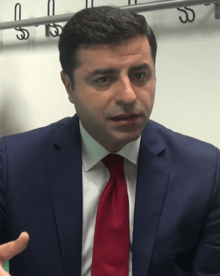 |
||||
| Metropolitan Municipalities | 18 (60.0%) | 6 (20.0%) | 3 (10.0%) | 2 (6.7%) | 0 (0.0%) | 0 (0.0%) |
18 / 30 |
6 / 30 |
3 / 30 |
2 / 30 |
0 / 30 |
0 / 30 | |
| District Municipalities | 800 (59.2%) | 226 (16.7%) | 166 (12.3%) | 97 (7.2%) | 27 (2.0%) | 6 (0.4%) |
800 / 1,351 |
226 / 1,351 |
166 / 1,351 |
97 / 1,351 |
27 / 1,351 |
6 / 1,351 | |
| Metropolitan Councillors | 10,530 (51.4%) | 4,161 (20.3%) | 3,501 (17.4%) | 1,441 (7.0%) | 411 (2.0%) | 165 (0.8%) |
10,530 / 20,498 |
4,161 / 20,498 |
3,501 / 20,498 |
1,441 / 20,498 |
411 / 20,498 |
165 / 20,498 | |
| Provincial Councillors | 779 (62.3%) | 159 (12.7%) | 174 (13.9%) | 129 (11.0%) | 5 (0.3%) | 4 (0.2%) |
779 / 1,251 |
159 / 1,251 |
174 / 1,251 |
129 / 1,251 |
5 / 1,251 |
4 / 1,251 | |
Below are the results for the elected councillors and municipal mayors. It should be noted that the number of councillor and mayoral positions up for election in 2014 vary widely in comparison to 2009 (See the local government reform section or 2013 Turkish local government reorganisation). For this reason, the changes per party in terms of officials elected between 2009 and 2014 are not representative of party performance. Rather, the change in proportion of officials held per party is a more accurate comparison between party performances since 2009, however it should also be taken into account that the abolition or introduction of several elected officials in certain areas where particular parties are the strongest has also led to disproportionate changes.[32][33][34][35][108][109]
Metropolitan municipality results
| 2014 metropolitan municipality mayoral results[28][32] | ||||||||||||||||||||||||||||||||||||||||||||||||||||||||||||||||||||||||||||||||||||||||||||||||||||||||||||||||||||||||||||||||||||||||||||||||||||||||||||||||||||||||||||||||||||||||||||||||||||||||||||||||||||||||||||||||||||||||||||||||||||||||||||||||||||||||||||||||||||||||
|---|---|---|---|---|---|---|---|---|---|---|---|---|---|---|---|---|---|---|---|---|---|---|---|---|---|---|---|---|---|---|---|---|---|---|---|---|---|---|---|---|---|---|---|---|---|---|---|---|---|---|---|---|---|---|---|---|---|---|---|---|---|---|---|---|---|---|---|---|---|---|---|---|---|---|---|---|---|---|---|---|---|---|---|---|---|---|---|---|---|---|---|---|---|---|---|---|---|---|---|---|---|---|---|---|---|---|---|---|---|---|---|---|---|---|---|---|---|---|---|---|---|---|---|---|---|---|---|---|---|---|---|---|---|---|---|---|---|---|---|---|---|---|---|---|---|---|---|---|---|---|---|---|---|---|---|---|---|---|---|---|---|---|---|---|---|---|---|---|---|---|---|---|---|---|---|---|---|---|---|---|---|---|---|---|---|---|---|---|---|---|---|---|---|---|---|---|---|---|---|---|---|---|---|---|---|---|---|---|---|---|---|---|---|---|---|---|---|---|---|---|---|---|---|---|---|---|---|---|---|---|---|---|---|---|---|---|---|---|---|---|---|---|---|---|---|---|---|---|---|---|---|---|---|---|---|---|---|---|---|---|---|---|---|---|---|---|---|---|---|---|---|---|---|---|---|---|---|---|---|---|
| ||||||||||||||||||||||||||||||||||||||||||||||||||||||||||||||||||||||||||||||||||||||||||||||||||||||||||||||||||||||||||||||||||||||||||||||||||||||||||||||||||||||||||||||||||||||||||||||||||||||||||||||||||||||||||||||||||||||||||||||||||||||||||||||||||||||||||||||||||||||||
District municipality results
| 2014 district municipality mayoral results[29][33] | ||||||||||||||||||||||||||||||||||||||||||||||||||||||||||||||||||||||||||||||||||||||||||||||||||||||||||||||||||||||||||||||||||||||||||||||||||||||||||||||||||||||||||||||||||||||||||||||||||||||||||||||||||||||||||||||||||||||||||||||||||||||||||||||||||||||||||||||||||||||||
|---|---|---|---|---|---|---|---|---|---|---|---|---|---|---|---|---|---|---|---|---|---|---|---|---|---|---|---|---|---|---|---|---|---|---|---|---|---|---|---|---|---|---|---|---|---|---|---|---|---|---|---|---|---|---|---|---|---|---|---|---|---|---|---|---|---|---|---|---|---|---|---|---|---|---|---|---|---|---|---|---|---|---|---|---|---|---|---|---|---|---|---|---|---|---|---|---|---|---|---|---|---|---|---|---|---|---|---|---|---|---|---|---|---|---|---|---|---|---|---|---|---|---|---|---|---|---|---|---|---|---|---|---|---|---|---|---|---|---|---|---|---|---|---|---|---|---|---|---|---|---|---|---|---|---|---|---|---|---|---|---|---|---|---|---|---|---|---|---|---|---|---|---|---|---|---|---|---|---|---|---|---|---|---|---|---|---|---|---|---|---|---|---|---|---|---|---|---|---|---|---|---|---|---|---|---|---|---|---|---|---|---|---|---|---|---|---|---|---|---|---|---|---|---|---|---|---|---|---|---|---|---|---|---|---|---|---|---|---|---|---|---|---|---|---|---|---|---|---|---|---|---|---|---|---|---|---|---|---|---|---|---|---|---|---|---|---|---|---|---|---|---|---|---|---|---|---|---|---|---|---|
| ||||||||||||||||||||||||||||||||||||||||||||||||||||||||||||||||||||||||||||||||||||||||||||||||||||||||||||||||||||||||||||||||||||||||||||||||||||||||||||||||||||||||||||||||||||||||||||||||||||||||||||||||||||||||||||||||||||||||||||||||||||||||||||||||||||||||||||||||||||||||
Municipal councillor results
| 2014 municipal councillor results[35][108] | ||||||||||||||||||||||||||||||||||||||||||||||||||||||||||||||||||||||||||||||||||||||||||||||||||||||||||||||||||||||||||||||||||||||||||||||||||||||||||||||||||||||||||||||||||||||||||||||||||||||||||||||||||||||||||||||||||||||||||||||||||||||||||||||||||||||||||||||||||||||||
|---|---|---|---|---|---|---|---|---|---|---|---|---|---|---|---|---|---|---|---|---|---|---|---|---|---|---|---|---|---|---|---|---|---|---|---|---|---|---|---|---|---|---|---|---|---|---|---|---|---|---|---|---|---|---|---|---|---|---|---|---|---|---|---|---|---|---|---|---|---|---|---|---|---|---|---|---|---|---|---|---|---|---|---|---|---|---|---|---|---|---|---|---|---|---|---|---|---|---|---|---|---|---|---|---|---|---|---|---|---|---|---|---|---|---|---|---|---|---|---|---|---|---|---|---|---|---|---|---|---|---|---|---|---|---|---|---|---|---|---|---|---|---|---|---|---|---|---|---|---|---|---|---|---|---|---|---|---|---|---|---|---|---|---|---|---|---|---|---|---|---|---|---|---|---|---|---|---|---|---|---|---|---|---|---|---|---|---|---|---|---|---|---|---|---|---|---|---|---|---|---|---|---|---|---|---|---|---|---|---|---|---|---|---|---|---|---|---|---|---|---|---|---|---|---|---|---|---|---|---|---|---|---|---|---|---|---|---|---|---|---|---|---|---|---|---|---|---|---|---|---|---|---|---|---|---|---|---|---|---|---|---|---|---|---|---|---|---|---|---|---|---|---|---|---|---|---|---|---|---|---|
| ||||||||||||||||||||||||||||||||||||||||||||||||||||||||||||||||||||||||||||||||||||||||||||||||||||||||||||||||||||||||||||||||||||||||||||||||||||||||||||||||||||||||||||||||||||||||||||||||||||||||||||||||||||||||||||||||||||||||||||||||||||||||||||||||||||||||||||||||||||||||
Provincial councillor results
| 2014 provincial councillor results[30][34] | ||||||||||||||||||||||||||||||||||||||||||||||||||||||||||||||||||||||||||||||||||||||||||||||||||||||||||||||||||||||||||||||||||||||||||||||||||||||||||||||||||||||||||||||||||||||||||||||||||||||||||||||||||||||||||||||||||||||||||||||||||||||||||||||||||||||||||||||||||||||||
|---|---|---|---|---|---|---|---|---|---|---|---|---|---|---|---|---|---|---|---|---|---|---|---|---|---|---|---|---|---|---|---|---|---|---|---|---|---|---|---|---|---|---|---|---|---|---|---|---|---|---|---|---|---|---|---|---|---|---|---|---|---|---|---|---|---|---|---|---|---|---|---|---|---|---|---|---|---|---|---|---|---|---|---|---|---|---|---|---|---|---|---|---|---|---|---|---|---|---|---|---|---|---|---|---|---|---|---|---|---|---|---|---|---|---|---|---|---|---|---|---|---|---|---|---|---|---|---|---|---|---|---|---|---|---|---|---|---|---|---|---|---|---|---|---|---|---|---|---|---|---|---|---|---|---|---|---|---|---|---|---|---|---|---|---|---|---|---|---|---|---|---|---|---|---|---|---|---|---|---|---|---|---|---|---|---|---|---|---|---|---|---|---|---|---|---|---|---|---|---|---|---|---|---|---|---|---|---|---|---|---|---|---|---|---|---|---|---|---|---|---|---|---|---|---|---|---|---|---|---|---|---|---|---|---|---|---|---|---|---|---|---|---|---|---|---|---|---|---|---|---|---|---|---|---|---|---|---|---|---|---|---|---|---|---|---|---|---|---|---|---|---|---|---|---|---|---|---|---|---|---|
| ||||||||||||||||||||||||||||||||||||||||||||||||||||||||||||||||||||||||||||||||||||||||||||||||||||||||||||||||||||||||||||||||||||||||||||||||||||||||||||||||||||||||||||||||||||||||||||||||||||||||||||||||||||||||||||||||||||||||||||||||||||||||||||||||||||||||||||||||||||||||
Results by province
The following results show winners by province as of 1 April 2014. Metropolitan provinces are in bold. AKP denotes provinces won by the Justice & Development Party, CHP denotes provinces won by the Republican People's Party, MHP denotes provinces won by the Nationalist Movement Party and BDP denotes provinces won by the Peace and Democracy Party.
|
|
|
|
|
Complaints & recounts
Provisional results in several districts were contested by all major parties, including the governing AKP, claiming misconduct during the counting process and thus demanding a recount. Applications for recounts were made to the YSK shortly after the elections concluded.[110][111] Turkey's Constitutional Court has rejected an individual application filed by Mansur Yavaş, the Republican People's Party's (CHP) candidate for mayor in Ankara.[112]
Electorate demographics
| AKP | CHP | MHP | BDP & HDP | Total | ||
|---|---|---|---|---|---|---|
| Gender | ||||||
| Male | 42 | 23 | 17 | 6 | 100 | |
| Female | 41 | 25 | 11 | 5 | 100 | |
| Age | ||||||
| 18-28 | 36 | 23 | 18 | 10 | 100 | |
| 29-43 | 44 | 22 | 14 | 7 | 100 | |
| >44 | 43 | 26 | 11 | 3 | 100 | |
| Education | ||||||
| Illiterate | 48 | 8 | 5 | 23 | 100 | |
| Literate with no diploma | 49 | 23 | 9 | 8 | 100 | |
| Primary school | 50 | 19 | 11 | 5 | 100 | |
| Middle school | 43 | 17 | 16 | 8 | 100 | |
| High school | 36 | 30 | 16 | 5 | 100 | |
| University | 29 | 35 | 17 | 1 | 100 | |
| Master's degree | 12 | 55 | 15 | 6 | 100 | |
| Income | ||||||
| <₺700 | 42 | 18 | 11 | 15 | 100 | |
| ₺701-₺1200 | 47 | 17 | 12 | 9 | 100 | |
| ₺1201-₺2000 | 42 | 25 | 15 | 4 | 100 | |
| ₺2001-₺3000 | 40 | 30 | 14 | 3 | 100 | |
| >₺3001 | 30 | 40 | 15 | 2 | 100 | |
| Employment | ||||||
| Civil servant | 34 | 29 | 18 | 1 | 100 | |
| Private sector | 33 | 30 | 19 | 1 | 100 | |
| Worker | 40 | 23 | 17 | 13 | 100 | |
| Tradespeople | 42 | 16 | 16 | 11 | 100 | |
| Retired | 40 | 32 | 11 | 1 | 100 | |
| Housewife | 48 | 20 | 9 | 7 | 100 | |
| Student | 25 | 32 | 18 | 10 | 100 | |
| Unemployed | 39 | 20 | 20 | 9 | 100 | |
| Ethnicity | ||||||
| Turkish | 42 | 26 | 16 | <1 | 100 | |
| Kurdish | 42 | 6 | 4 | 39 | 100 | |
| Religion | ||||||
| Sunni Muslim | 45 | 20 | 14 | 6 | 100 | |
| Alevi Muslim | 9 | 69 | 5 | 6 | 100 | |
| Turkey | 42 | 24 | 14 | 6 | 100 | |
| AKP | CHP | MHP | BDP | Turkey | ||
|---|---|---|---|---|---|---|
| Gender | ||||||
| Male | 49 | 46 | 60 | 52 | 49 | |
| Female | 51 | 54 | 40 | 48 | 51 | |
| Total | 100 | 100 | 100 | 100 | 100 | |
| Age | ||||||
| 18-28 | 21 | 24 | 33 | 40 | 25 | |
| 29-43 | 37 | 31 | 35 | 34 | 34 | |
| >44 | 42 | 45 | 32 | 26 | 41 | |
| Total | 100 | 100 | 100 | 100 | 100 | |
| Education | ||||||
| Illiterate | 6 | 2 | 2 | 21 | 5 | |
| Literate with no diploma | 2 | 2 | 1 | 3 | 2 | |
| Primary school | 44 | 30 | 30 | 26 | 37 | |
| Middle school | 15 | 10 | 16 | 21 | 14 | |
| High school | 24 | 34 | 33 | 24 | 28 | |
| University | 9 | 20 | 17 | 4 | 13 | |
| Master's degree | 0 | 2 | 1 | 1 | 1 | |
| Total | 100 | 100 | 100 | 100 | 100 | |
| Income | ||||||
| <₺700 | 8 | 6 | 6 | 22 | 8 | |
| ₺701-₺1200 | 37 | 23 | 30 | 52 | 33 | |
| ₺1201-₺2000 | 35 | 36 | 38 | 21 | 35 | |
| ₺2001-₺3000 | 15 | 19 | 16 | 5 | 16 | |
| >₺3001 | 7 | 15 | 10 | 0 | 9 | |
| Total | 100 | 100 | 100 | 100 | 100 | |
| Employment | ||||||
| Employed | 36 | 37 | 46 | 37 | 38 | |
| Retired | 14 | 19 | 12 | 4 | 15 | |
| Housewife | 40 | 29 | 24 | 26 | 35 | |
| Student | 5 | 11 | 11 | 14 | 8 | |
| Unemployed | 4 | 3 | 6 | 7 | 4 | |
| Unable to work | 1 | 0 | 1 | 2 | 1 | |
| Total | 100 | 100 | 100 | 100 | 100 | |
| Ethnicity | ||||||
| Turkish | 81 | 88 | 92 | 3 | 80 | |
| Kurdish | 13 | 3 | 3 | 88 | 13 | |
| Zaza | 1 | 2 | 0 | 10 | 2 | |
| Arab | 1 | 2 | 0 | 0 | 1 | |
| Other | 4 | 5 | 4 | 0 | 4 | |
| Total | 100 | 100 | 100 | 100 | 100 | |
| Religion | ||||||
| Sunni Muslim | 99 | 78 | 98 | 95 | 93 | |
| Alevi Muslim | 1 | 18 | 2 | 3 | 6 | |
| Other | 0 | 4 | 0 | 1 | 1 | |
| Total | 100 | 100 | 100 | 100 | 100 | |
Detailed results by province
Metropolitan municipalities
The following articles document the results within the three main provinces of Turkey.
District municipalities
See also
References
- 1 2 "Turkish elections turn deadly in local feuds". Al Jazeera English. 30 March 2014. Retrieved 31 March 2014.
- ↑ "Erdogan's AKP wins most of Turkey's mayoral elections". Toronto Star. 30 March 2014. Retrieved 31 March 2014.
- ↑ "As it happened: PM Erdoğan declares local poll victory amid fraud claims". Hurriyet Daily News. 30 March 2014. Retrieved 31 March 2014.
- ↑ "Widespread fraud reports mark local elections". Today's Zaman. 30 March 2014. Archived from the original on 31 March 2014. Retrieved 31 March 2014.
- ↑ Mynet (26 March 2014). "Mansur Yavaş Ve Melih Gökçekten Açıklama Haberi ve Son Dakika Haberler Mynet". Mynet. Retrieved 31 March 2014.
- ↑ "Yalova 1 oy fark ile Ak Parti'de". Milliyet Haber. 31 March 2014. Retrieved 31 March 2014.
- ↑ "AB Bakanı Mevlüt Çavuşoğlu oy sayarken". sozcu.com.tr. 2 April 2014. Retrieved 29 October 2015.
- ↑ "Taner Yıldız'dan elektrik kesintisi açıklaması". NTV. 1 April 2014. Retrieved 29 October 2015.
- ↑ "Rekor geçersiz oy". Rekor geçersiz oy. Archived from the original on 3 April 2014. Retrieved 29 October 2015.
- ↑ "AKP'nin oy desteği ne yüzde 45, ne yüzde 43; yüzde 36!". t24.com.tr. Retrieved 29 October 2015.
- ↑ "Seçimler hileli! İşte CHP oylarının çalındığının belgeleri". gazetecileronline.com. Archived from the original on 6 October 2014. Retrieved 29 October 2015.
- ↑ "Toprakkale'de oylar yakıldı!". Haber7. 31 March 2014. Retrieved 29 October 2015.
- ↑ http://www.enerjihaber.com/komur_talebi_patladi-3-haber-2091.html
- ↑ "Oy kullanamayacaklar, çünkü 'ölü' görünüyorlar". Sabah. 29 March 2014. Retrieved 29 October 2015.
- ↑ Constanze Letsch in Istanbul (30 March 2014). "Turkish local elections: AKP set for victory". Guardian. Retrieved 31 March 2014.
- ↑ "Ak Parti Ankara'da Zaferini İlan Etti, CHP İtiraz Etti !". Gazetebalikesir. Retrieved 31 March 2014.
- ↑ "Bu illerde oylar yeniden sayılacak!". Time Turk. 31 March 2014. Retrieved 31 March 2014.
- ↑ Yıldız Yazıcıoğlu (31 March 2014). "Ankara'da İtiraz Yolu Göründü". Amerika'nin Sesi. Retrieved 31 March 2014.
- ↑ "Yalova mayoralty changes hands after CHP's demand for vote recount – POLITICS". hurriyetdailynews.com. Retrieved 29 October 2015.
- ↑ Gianluca Mezzofiore. "Turkey's Riot Police Use Water Cannons on Vote Fraud Protesters". International Business Times UK. Retrieved 29 October 2015.
- ↑ "Turkish police use water cannon against protest rally". digitaljournal.com. Retrieved 29 October 2015.
- ↑ Ayşegül USTA/İSTANBUL (5 June 2015). "Yerel seçimde hile cezası 5 yıl hapis". hurriyet.com.tr. Retrieved 29 October 2015.
- ↑ "Bunları biliyor musunuz?Bunları biliyormuydunuz?seçimler için aday tanıtım forumu,genel seçimler,yerel seçimler". Kimneredenaday. Retrieved 31 March 2014.
- ↑ "Türkiye'de kaç muhtar var biliyor musunuz?". İHA. 16 May 2009. Retrieved 31 March 2014.
- ↑ "SEÇİM SONUÇLARI – 2009 Yerel Seçim Sonuçları". Seçim Haberler. Retrieved 31 March 2014.
- ↑ "KAPANACAK KÖY ve BELDELER LİSTESİ (BÜYÜKŞEHİRLER)".
- ↑ http://www.ordugazete.com/ordu%E2%80%99da-23-belediye-kapaniyor/HaberDetay/1529
- 1 2 3 "Official 2009 metropolitan municipal results" (PDF). Supreme Electoral Council of Turkey. Retrieved 4 August 2014.
- 1 2 3 "Official 2009 district municipal results" (PDF). Supreme Electoral Council of Turkey. Retrieved 4 August 2014.
- 1 2 3 "Official 2009 provincial councillor results" (PDF). Supreme Electoral Council of Turkey. Retrieved 4 August 2014.
- 1 2 "Official 2009 municipal councillor results" (PDF). Supreme Electoral Council of Turkey. Retrieved 4 August 2014.
- 1 2 3 "Official 2014 metropolitan municipal results" (PDF). Supreme Electoral Council of Turkey. Retrieved 4 August 2014.
- 1 2 3 "Official 2014 district municipal results" (PDF). Supreme Electoral Council of Turkey. Retrieved 4 August 2014.
- 1 2 3 "Official 2014 provincial councillor results" (PDF). Supreme Electoral Council of Turkey. Retrieved 4 August 2014.
- 1 2 3 "Official 2014 municipal councillor results" (PDF). Supreme Electoral Council of Turkey. Retrieved 4 August 2014.
- ↑ "Turkey: Gezi Park protests: Brutal denial of the right to peaceful assembly in Turkey". Amnesty International. 2 October 2013. Retrieved 31 March 2014.
- ↑ "Gezi puts its mark on EU". Hurriyet Daily News. Retrieved 31 March 2014.
- ↑ Dombey, Daniel (14 June 2013). "Germany seeks to halt EU-Turkey talks over handling of protests". Financial Times. Retrieved 31 March 2014.
- ↑ "Tapes are 'as real as Ararat': Main opposition CHP leader". Hurriyet Daily News. 25 February 2014. Retrieved 31 March 2014.
- ↑ "TÜBİTAK Erdoğan'a "sesler montaj" raporu vermedi". OdaTV. 10 March 2014. Retrieved 31 March 2014.
- ↑ ""TÜBİTAK montaj raporu vermedi" iddiası". Nediyor. 10 March 2014. Retrieved 31 March 2014.
- ↑ "'TÜBİTAK montaj raporu vermeyince mi TİB kayıtları sildi?'". Evrensel. 10 March 2014. Retrieved 31 March 2014.
- ↑ "TÜBİTAK'ta 6 Kişi Görevden Alındı". Bianet. 26 February 2014. Retrieved 31 March 2014.
- ↑ "TÜBİTAK'ta beş kişi görevden alındı". Sabah. 26 February 2014. Retrieved 31 March 2014.
- ↑ "Görevden Alınan Tübitak Yöneticisi: Böcek Raporunda Tahrifat Yapmam İstendi Haberi ve Son Dakika Haberler Mynet". Mynet. 27 February 2014. Retrieved 31 March 2014.
- ↑ "Görevden alınan TÜBİTAK yöneticisinden sert açıklama". Hurriyet. 20 February 2014. Retrieved 31 March 2014.
- ↑ "Türkiye'de yolsuzluk karşıtı protestolar dinmiyor". DW. 27 February 2014. Retrieved 31 March 2014.
- ↑ "Sokaklarda Yolsuzluk Protestoları Sürüyor". Bianet. 1 March 2014. Retrieved 31 March 2014.
- ↑ "CHP'den yolsuzluk protestosu". Hurriyet. 26 February 2014. Retrieved 31 March 2014.
- ↑ "Ayakkabı kutusundan çıkan 4,5 milyon dolar iade edilmiş". T24. 25 February 2014. Retrieved 31 March 2014.
- ↑ "İstanbul'da yolsuzluk protestoları". Halklarin Demokratik Kongresi. 1 March 2014. Retrieved 31 March 2014.
- ↑ "6 merkezde yolsuzluk protestoları". Etha. 26 February 2014. Retrieved 31 March 2014.
- ↑ "Türkiye'deki yargı sistemi, HSYK yasasının geleceği ve 17 Aralık süreci: Dört Bir Taraf – 16.01.2014 – 16.01.2014 21:30:00 – Dört Bir Taraf". Tv.cnnturk.com. 16 January 2014. Retrieved 31 March 2014.
- ↑ "Yeni internet yasası ile gelen yasaklar (İnternette neler yasak?)". Milliyet. 16 January 2014.
- ↑ "İşte kabul edilen MİT yasası". Milliyet. 24 February 2014. Retrieved 31 March 2014.
- ↑ Constanze Letsch (6 February 2014). "Turkey pushes through new raft of 'draconian' internet restrictions". The Guardian. Retrieved 31 March 2014.
- ↑ "Police and protesters clash over new Turkish internet law". BBC. 8 February 2014. Retrieved 31 March 2014.
- ↑ "Istanbul clashes over Turkey's new internet laws". BBC. 8 February 2014. Retrieved 31 March 2014.
- ↑ "Turkey blocks Twitter, after Erdoğan vowed 'eradication' – POLITICS". hurriyetdailynews.com. Retrieved 29 October 2015.
- ↑ "UPDATE 3-Turkey blocks Twitter days before vote as PM fights scandal". Reuters UK. Retrieved 29 October 2015.
- ↑ "Data Show Turkey's Tweeters Beating Ban". MIT Technology Review. Retrieved 29 October 2015.
- ↑ "Turkey expands Internet blocks from Twitter to DNS". ITProPortal. Retrieved 29 October 2015.
- ↑ "Turkey Blocks Google, Level 3 DNS Services". PCMAG. Retrieved 29 October 2015.
- ↑ "Google confirms Turkish ISPs 'intercepted' its DNS service". theregister.co.uk. Retrieved 29 October 2015.
- ↑ "Erdogan blocks Twitter. #ErdoganBlockedTwitter now trending — in Turkey". warincontext.org. Retrieved 29 October 2015.
- ↑ "Twitter neden tamamen yasaklandı". hurriyet.com.tr. 21 March 2014. Retrieved 29 October 2015.
- ↑ "Başsavcılıktan 'yasak' açıklaması: Bizim böyle bir kararımız yok". Radikal. Retrieved 29 October 2015.
- ↑ "Başsavcılıktan 'yasak' açıklaması: Bizim böyle bir kararımız yok". Posta. Retrieved 29 October 2015.
- ↑ "US Representatives introduce resolution against Turkey's ban on Twitter and Youtube – AMERICAS". hurriyetdailynews.com. Retrieved 29 October 2015.
- ↑ "Google marketing chief attacks 'very sad' YouTube and Twitter ban by Turkey". marketingmagazine.co.uk. Retrieved 29 October 2015.
- ↑ "Anayasa Mahkemesi'nden Twitter kararı". CNN Türk. 2 April 2014. Retrieved 29 October 2015.
- ↑ "Turkey's Twitter ban violates free speech: constitutional court". Reuters. Retrieved 29 October 2015.
- ↑ "Turkey blocks access to YouTube". Financial Times. Retrieved 29 October 2015.
- ↑ "Cumhuriyet Gazetesi – Bomba ses kaydı: Seçim için savaş planı". cumhuriyet.com.tr. 27 March 2014. Retrieved 29 October 2015.
- ↑ "Gündemi sarsan ses kaydı: Devletin Suriye planı". Radikal. Retrieved 29 October 2015.
- ↑ YouTube. youtube.com. Retrieved 29 October 2015.
- ↑ YouTube. youtube.com. Retrieved 29 October 2015.
- ↑ Constanze Letsch. "Turkey blocks YouTube amid 'national security' concerns". the Guardian. Retrieved 29 October 2015.
- 1 2 Jonny Hogg & Gülşen Solaker. "Rival parties warn of fraud in Turkey's key local elections". Reuters. Retrieved 31 March 2014.
- ↑ "Seçimler öncesi büyük hile!". haber.gazetevatan.com. Retrieved 31 March 2014.
- ↑ "Seçim Gecesinde Elektrik Kesintileri Tartışılıyor". Amerika'nin Sesi – Voice of America – Turkish. Retrieved 29 October 2015.
- ↑ "Cumhuriyet Gazetesi – Bir ses kaydı daha: 'CHP afişlerine Erdoğan ve Gökçek sansürü'". cumhuriyet.com.tr. 25 February 2014. Retrieved 29 October 2015.
- ↑ CHP AFİŞLERİ SANSÜRLENİYOR MELİH GÖKÇEK SES KAYDI. YouTube. 25 February 2014. Retrieved 29 October 2015.
- ↑ "Yerel seçim öncesi başkentten bomba iddia". internethaber.com. 5 March 2014. Retrieved 31 March 2014.
- ↑ "Cumhuriyet Gazetesi – Çiğdem Toker: "141 Milyon 654 Bin 161 Oy Pusulası. Kaçı Fazla?"". cumhuriyet.com.tr. 24 February 2014. Retrieved 29 October 2015.
- ↑ "Neden fazla oy pusulası basıldığını açıkladı". samanyoluhaber.com. 25 March 2014. Retrieved 31 March 2014.
- 1 2 "SEÇİM ÖNCESİ TÜYLER ÜRPERTEN HİLE İDDİALARI!". Habererk Haber, Dünya Son Dakika Haberleri. Retrieved 31 March 2014.
- ↑ "Seçim öncesi 'uçan mürekkep' polemiği". 15 March 2014.
- ↑ "İzmir'de sahte oy pusulası baskını". İhlas Haber Ajansı. 29 March 2014.
- ↑ http://www.haberturk.com/gundem/haber/934279-sahte-oy-pusulasi-baskini%7Cpublisher=Habertürk
- ↑ http://www.mgdtv.com/izmirde-sahte-oylar-basildi-mi-.html. Missing or empty
|title=(help) - ↑ http://www.haberturk.com/gundem/haber/934279-sahte-oy-pusulasi-baskini%7Cpublisher=Habertürkrict
- ↑ editor, avrupagazete. "Mühür Basılmış Pusulalar Bulundu, 'Ak Parti'ye Evet' - AV".
- ↑ Gücü, www.aydinyeniufuk.com.tr Ulusal ve Yerel Medyanın. "Aydın Haberleri - Aydın Son Dakika Haberleri - Aydın Yeni Ufuk".
- ↑ "Archived copy". Archived from the original on 2014-04-07. Retrieved 2014-04-01.
- ↑ "Akp'ye "Evet" Mührü Basılmış Pusulalarla Dolu Araç Yakalandı". egeninsesi.com. Retrieved 1 April 2014.
- ↑ Zeynep GÜRCANLI-ANKARA (25 November 2013). "CHP'li Gürsel Tekin'den çarpıcı iddia".
- ↑ "Suriyeli mülteciler oy mu kullanacak? Bomba iddia!". İnternethaber.com. 4 September 2013.
- ↑ "Cumhuriyet Gazetesi - Tekin: Suriyeliler oy kullanacak!". 24 November 2013.
- ↑ Demokrat Haber (28 March 2014). "Suriyeli mülteciler 30 Mart'ta oy kullanacak mı?". Demokrat Haber.
- ↑ "Ergin canlı yayında cevapladı! Suriyeliler oy kullanacak mı?".
- ↑ "Sandık başında 3 Suriyeli yakalandı SON DAKİKA". İnternethaber.com. 30 March 2014.
- ↑ Osman Kaytazoglu (30 March 2014). "Turkey election: What the voters say". Al Jazeera English. Retrieved 31 March 2014.
- ↑ "Seçim kavgası: 8 ölü 72 yaralı". Aksam.com.tr. 30 March 2014. Retrieved 31 March 2014.
- ↑ "Turkey-Record fraud rate in local elections: 1418 cases". Sendika.org. 30 March 2014. Retrieved 31 March 2014.
- ↑ Mynet (30 March 2014). "Seçim Günü Elektrik Kesintisi Haberi ve Son Dakika Haberler Mynet". Mynet.com. Retrieved 31 March 2014.
- ↑ "Seçim sonuçlarında AA ve Cihan şaşkınlığı! haberi". Internethaber.com. 30 March 2014. Retrieved 31 March 2014.
- 1 2 "Official results for municipal councils" (PDF). Supreme Electoral Council of Turkey. Retrieved 11 May 2014.
- ↑ "Official results" (PDF). Official Gazette of the Republic of Turkey. Retrieved 7 May 2014.
- ↑ "Political parties challenge local election results in Turkey". turkishpress.com. Retrieved 29 October 2015.
- ↑ "Opposition calls for votes to be recounted in Turkish election". euronews. Retrieved 29 October 2015.
- ↑ "Top court rejects CHP's application over rigging in Ankara local poll". Today's Zaman. July 23, 2014. Retrieved September 4, 2014.
- 1 2 KONDA Research and Consultancy, 30 Mart Yerel Seçimler Sonrası Sandık ve Seçmen Analizi
External links
![]()
.jpg)
.jpg)
